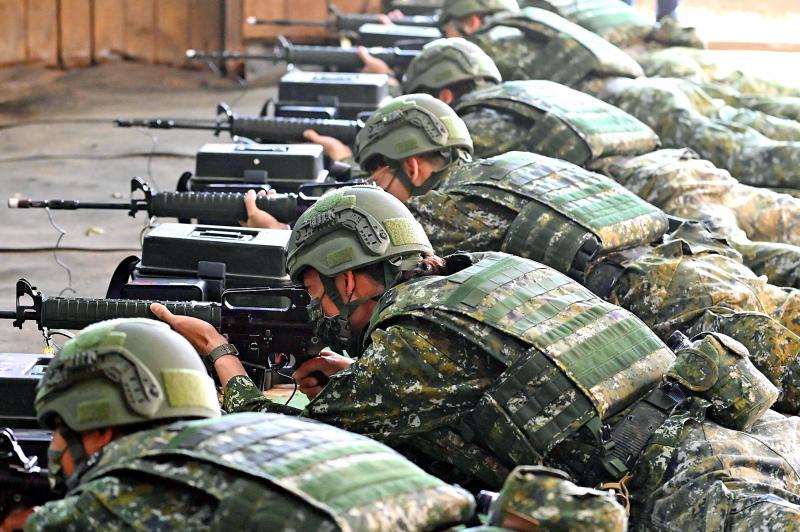Proposals to amend security and defense laws are aimed at better preparing the nation’s private security guards for civil defense in wartime, Democratic Progressive Party (DPP) Legislator Chang Liao Wan-chien (張廖萬堅) said yesterday.
Chang Liao and other DPP legislators have proposed amendments to the Private Security Service Act (保全業法) and the All-out Defense Mobilization Readiness Act (全民防衛動員準備法) to allow the Ministry of National Defense to train private security firms in civil defense so that they can be incorporated into the nation’s civil defense system in wartime.
“Security personnel are involved in protecting various aspects of life in Taiwan, such as residential buildings, commercial offices, transit stations, construction sites, factories, hospitals and power plants,” Chang Liao said. “This group of frontline staff is familiar with the public and the nation’s terrain, and could be an important force in defending the country.”

Photo: Sam Yeh, AFP
One of the proposals would amend Article 15 of the All-out Defense Mobilization Readiness Act, which states that during wartime, authorities should organize “professional citizens, civil defense forces, volunteer firefighters and rescue personnel, as well as ... school youths, retired veterans” and others into defense plans. The amendment would add security guards to that list.
The proposals would benefit defense efforts by offloading some tasks traditionally performed by the military and police to the private security industry, Institute for National Defense and Security Research postdoctoral researcher Hsu Chih-hsiang (許智翔) said.
Efficient deployment of labor is important to a nation like Taiwan, which has “relatively few troops,” he said, adding that civil defense forces could respond effectively to disaster scenarios.
Community security would be important in helping people take refuge, as they would know the location of safe spaces, civilian resources and how many people could be accommodated, he said.
“For example, look at the war in Ukraine. When residential and commercial buildings came under fire, building security knew better than anyone how to evacuate those buildings,” he said. “When whole communities need to evacuate or take refuge, it is community authorities who best know what refuge spaces there are, and what resources the community has.”
Security Industries Association president Chang Ta-chang (張達錩) said he hoped the law could be amended as soon as possible so that the military could start training security guards.

POSITIVE DEVELOPMENT: Japan and the US are expected to hold in-depth discussions on Taiwan-related issues during the meeting next month, Japanese sources said The holding of a Japan-US leaders’ meeting ahead of US President Donald Trump’s visit to China is positive news for Taiwan, former Japan-Taiwan Exchange Association representative Hiroyasu Izumi said yesterday. After the Liberal Democratic Party’s landslide victory in Japan’s House of Representatives election, Japanese Prime Minister Sanae Takaichi is scheduled to visit the US next month, where she is to meet with Trump ahead of the US president’s planned visit to China from March 31 to April 2 for a meeting with Chinese President Xi Jinping (習近平). Japan and the US are expected to hold in-depth discussions on Taiwan-related issues during the

‘LIKE-MINDED PARTNER’: Tako van Popta said it would be inappropriate to delay signing the deal with Taiwan because of China, adding he would promote the issue Canadian senators have stressed Taiwan’s importance for international trade and expressed enthusiasm for ensuring the Taiwan-Canada trade cooperation framework agreement is implemented this year. Representative to Canada Harry Tseng (曾厚仁) in an interview with the Central News Agency (CNA) said he was increasingly uneasy about Ottawa’s delays in signing the agreement, especially as Ottawa has warmed toward Beijing. There are “no negotiations left. Not only [is it] initialed, we have three versions of the text ready: English, French and Mandarin,” Tseng said. “That tells you how close we are to the final signature.” Tseng said that he hoped Canadian Prime Minister Mark Carney

President William Lai (賴清德) yesterday bestowed one of Taiwan’s highest honors on Saint Vincent and the Grenadines (SVG) Ambassador Andrea Clare Bowman in recognition of her contributions to bilateral ties. “By conferring the Order of Brilliant Star with Grand Cordon on Ambassador Bowman today, I want to sincerely thank her, on behalf of the Taiwanese people, for her outstanding contribution to deepening diplomatic ties between Taiwan and SVG,” Lai said at a ceremony held at the Presidential Office in Taipei. He noted that Bowman became SVG’s first ambassador to Taiwan in 2019 and

A man walks past elementary school artworks at the Taipei Lantern Festival in Ximen District yesterday, the first day of the event. The festival is to run from 5pm to 10pm through March 15.